UK Government Tightens Citizenship Rules for Small Boat Refugees
In a recent announcement, the UK Home Office unveiled new measures that will effectively deny British citizenship to refugees who enter the country illegally, particularly those arriving on small boats. The updated guidance, released on Monday, outlines stringent criteria that make it nearly impossible for individuals who have made perilous journeys to secure citizenship, regardless of the duration since their illegal entry.
The Home Office emphasized that any individual who enters the UK unlawfully, whether through risky means like small boat crossings or concealed in vehicles, will likely have their citizenship application rejected. This policy shift marks a significant departure from previous practices, which required refugees who arrived via irregular routes to wait at least a decade before being considered for citizenship.
While the government asserts that these changes are necessary to address border security concerns and combat human trafficking, critics have swiftly condemned the new regulations. Organizations like the Refugee Council and some Labour MPs, including Stella Creasy, have expressed strong opposition to the revised guidelines, arguing that they perpetuate a system of second-class citizenship for refugees.
The revised guidance, which was first revealed by the Free Movement blog, includes explicit language that underscores the government’s stance on granting citizenship to individuals who have entered the UK illegally. Notably, the updated criteria state that applicants who arrived without proper entry clearance or electronic travel authorization after a hazardous journey will likely be denied citizenship, effective February 10, 2025.
Enver Solomon, CEO of the Refugee Council, decried the government’s decision, asserting that it contradicts the principles of compassion and integration that should guide refugee policy. Solomon stressed that refugees seek to become active members of their new communities and contribute positively to society, and urged government officials to reconsider the restrictive measures.
Immigration barrister Colin Yeo echoed similar sentiments on social media, arguing that the government’s actions represent a violation of international refugee conventions. Yeo’s critique underscores the broader ethical implications of the UK’s increasingly stringent immigration policies and their impact on vulnerable populations seeking asylum.
While the Conservative Party has yet to issue an official response to the new guidelines, party leader Kemi Badenoch has previously voiced support for stricter citizenship requirements. Badenoch stated that permanent residency and citizenship should be reserved for individuals who demonstrate a genuine commitment to the UK, hinting at the government’s broader agenda to tighten immigration controls and prioritize national security.
The Home Office’s enforcement efforts have also intensified in recent weeks, with raids conducted on hundreds of businesses across the country as part of a crackdown on illegal working. These coordinated actions underscore the government’s commitment to upholding immigration laws and preventing exploitation of vulnerable workers.
As the debate surrounding immigration policy continues to unfold, the implications of the UK’s restrictive citizenship rules for refugees remain a contentious topic. The government’s decision to deny citizenship to small boat refugees reflects a broader shift towards more stringent border controls and raises questions about the fundamental rights and protections afforded to individuals seeking asylum in the country.
In light of these developments, advocates for refugee rights and immigration reform are calling for a more compassionate and inclusive approach to refugee policy, one that prioritizes integration and community support for those fleeing conflict and persecution. The ongoing dialogue on citizenship criteria and border security measures will undoubtedly shape the future of refugee policy in the UK and beyond.













